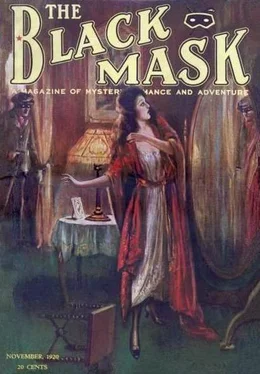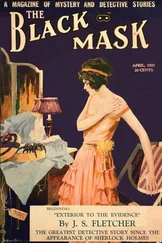Hamilton Craigie - The Black Mask Magazine (Vol. 2, No. 2 — November 1920)
Здесь есть возможность читать онлайн «Hamilton Craigie - The Black Mask Magazine (Vol. 2, No. 2 — November 1920)» весь текст электронной книги совершенно бесплатно (целиком полную версию без сокращений). В некоторых случаях можно слушать аудио, скачать через торрент в формате fb2 и присутствует краткое содержание. Город: New York, Год выпуска: 1920, Издательство: Pro-distributors Publishing Company, Жанр: Классический детектив, на английском языке. Описание произведения, (предисловие) а так же отзывы посетителей доступны на портале библиотеки ЛибКат.
- Название:The Black Mask Magazine (Vol. 2, No. 2 — November 1920)
- Автор:
- Издательство:Pro-distributors Publishing Company
- Жанр:
- Год:1920
- Город:New York
- ISBN:нет данных
- Рейтинг книги:5 / 5. Голосов: 1
-
Избранное:Добавить в избранное
- Отзывы:
-
Ваша оценка:
- 100
- 1
- 2
- 3
- 4
- 5
The Black Mask Magazine (Vol. 2, No. 2 — November 1920): краткое содержание, описание и аннотация
Предлагаем к чтению аннотацию, описание, краткое содержание или предисловие (зависит от того, что написал сам автор книги «The Black Mask Magazine (Vol. 2, No. 2 — November 1920)»). Если вы не нашли необходимую информацию о книге — напишите в комментариях, мы постараемся отыскать её.
The Black Mask Magazine (Vol. 2, No. 2 — November 1920) — читать онлайн бесплатно полную книгу (весь текст) целиком
Ниже представлен текст книги, разбитый по страницам. Система сохранения места последней прочитанной страницы, позволяет с удобством читать онлайн бесплатно книгу «The Black Mask Magazine (Vol. 2, No. 2 — November 1920)», без необходимости каждый раз заново искать на чём Вы остановились. Поставьте закладку, и сможете в любой момент перейти на страницу, на которой закончили чтение.
Интервал:
Закладка:
He stopped and glanced around the room. The impression he had made on his hearers was one that would have satisfied an actor most avid for attention. Oglethorpe and the Assistant District Attorney were listening intently. Sylvia Granger and her lover, whose hand she still held, were leaning forward, their eyes glowing with excitement. Even Delaney, the skeptic, had dropped his pose of indifference.
Song Kee continued.
“My next step was to visit the scene of the crime to discover—well, if the thing could have been done as I had imagined. And incidentally I paid my respects to Mr. Sito Okawa, a most courteous gentleman. That visit was productive of several things. One was the knowledge of exactly where the dancing woman had been when she was killed. And standing where she had been, I saw the place from which an arrow could have been shot. Mr. Delaney had given me the approximate angle at which the knife had been driven into the body and this angle corresponded to that which would have obtained had the woman been killed by an arrow shot through the open transom of a room twenty-five feet down the hall.
“I left Mr. Okawa and questioned the clerk of the hotel. He told me that on the night of the murder the room in question had been unoccupied. The room opposite was the bedroom of Count Angellotti.”
“Then it was the dago you suspected?” Delaney again broke out.
Song Kee smiled softly upon the now thoroughly excited detective. He seemed about to answer him. Then he changed his mind and said, “Will you pass me my cane, Mr. Delaney?”
“Mr. Grover,” he said when Delaney had handed him the cane, “have you ever seen this cane before?”
He held out the bamboo stick.
Grover started in surprise. The seeming irrelevance of the question dazed him for an instant. Then he looked closely at the cane.
“Why, yes, I think so,” he said hesitatingly. Then: “Yes, yes, I remember. It’s—”
But Song Kee stopped him.
“Sh!” he said quickly. “Would you mind writing the name of its owner on that slip of paper on the desk beside you?”
As Grover obeyed, he went on.
“Now, gentlemen, I must confess to a slight infraction of your laws. The next thing I did was to provide myself with some skeleton keys. Armed with these I again visited the fourth floor of the Ralston Hotel. In the room I unlawfully entered I found that for which I searched. I found the bow that had driven the arrow into Irene Grenville’s breast.”
He answered the question in their eyes.
“You are wondering what I did with it. I brought it here. It is here.”
He held out the cane.
“Look!”
With a deft movement he pulled at the handle. It came out of the bamboo stick. And the handle was the hilt of a long, evilly shaped knife, the blade of which had been hidden in the hollow of the bamboo.
“This,” he said in explanation, “is the arrow which brought death to the dancing woman. Through the kindness of Mr. Delaney I was able to borrow it this morning. And this,” he bent the long stick of bamboo, “is the bow. String it with a piece of cord beyond the joints at either end and you have a deadly and effective weapon.”
“Wait a minute—wait a minute,” Delaney shouted. “I beg your pardon, Mr. Commissioner, but let’s get this thing straight. D’ye mean to say Mister Song Kee, that some guy who had it in for the Grenville woman hid in the vacant room and potted her when she went down the hall?”
“Exactly.”
“Pretty fishy! But we won’t say nothin’ about that. Maybe though you won’t mind tellin’ me, if this cock and bull story of yours is true, how Grover’s finger-prints come to be on the knife?”
Song Kee smiled patiently.
“How did your own get there?”
“Mine—they never were there!”
Song Kee smiled again, but less patiently.
“Listen, Mr. Delaney. Just a few moments ago I asked you to pass me my cane. You did so, giving it to me by the handle. Now, providing someone who touched it after you, wearing gloves and touching it only at its very end, had pulled it from its sheath and using it as an arrow had shot it into a body — whose finger-prints would then be on it?”
He laughed outright at the expression on Delaney’s face.
“I don’t blame you,” he said, “for your surprise. We are dealing in this case with a man who was very subtle—a man who manufactured, not lies, but facts, to cover his crime. One must marvel at him. Patiently he waited and studied the habits of the woman he had come to kill. He found that she invariably left her apartments on her way to the theatre promptly at seven-fifteen. He arranged that someone should be in the hall at that time on the night he intended to murder her. He even arranged that the finger-prints of that person should be upon the weapon he was to use. This he contrived by the very simple method which I have just now used to convince the skeptical Mr. Delaney. Read, Mr. Grover, the name of the murderer on the slip of paper you are holding in your hand.
In a trembling voice Grover read the name he had written in compliance with Song Kee’s request that the identity of the owner of the cane be set down on paper rather than spoken.
“Sito Okawa.”
“Now tell us when and where you last saw Mr. Okawa’s cane.”
“In the restaurant at luncheon on the day of the murder. It was the occasion upon, which we made the appointment to meet in his rooms that night. He was leaving without it. When he remembered it, and as I was nearer to it than he, he asked me to hand it to him.”
“Which you did—and left your fingerprints on the handle.”
Song Kee rose and bowed like a showman finished with his exhibition.
At once everyone in the room began to talk, plying him with questions. The jangling of the telephone brought a tardy silence. Commissioner Oglethorpe answered it.
“Yes? Good God! Go on, go on! He, left a note? Read it.”
Oglethorpe hung up the receiver with a bang.
He turned to his companions and said gravely:
“Sito Okawa killed himself in the Ralston Hotel last night. A note was found beside his body saying that he had killed Irene Grenville to avenge the dishonored name of his family.”
Everyone except Song Kee and Delaney stared fixedly at the Commissioner, Delaney was watching the Chinaman, who was standing unmoved and unperturbed, looking out of the window.
“Say, Mr. Song Kee,” the detective said grimly. “What did you have to do with this last?”
Song Kee shrugged.
“Perhaps nothing—perhaps everything,” he answered. “I don’t know. Last night when I went to his room I left a message. It was to the effect that it would be unfitting that the person of one of the Samurai be held in bondage and punished by foreigners even in the enforcement of their laws... It may be that he understood.”
The Georgetown Mystery
by William Wallace Major
I.
It was seven o’clock in the morning and Marshal John McAlpin, of Georgetown, was frenziedly ringing a wall telephone at Herman Matthews’ store.
“Gimme Rockland, quick!” he shouted into the transmitter when he at last had the operator on the wire. “I’m in a hurry, Lou; git a move on. I ain’t got no time to be wastin’ on you. Gimme Rockland at once.”
In a few seconds there was a noise in the distance.
“Rockland? ’At you, Rockland? This is Marshal McAlpin at Georgetown. Gimme Prosecutor Thornton or the sheriff right away. Hell’s a-poppin’ down here. They’s bin a murder committed, mebbe two. Hurry up, now.”
Soon the marshal had the prosecutor on the wire, and hastily, disjointedly chopped out the facts as he knew them.
“I’ll be right down,” Thornton told him, somewhat excited himself. “I’ll bring the sheriff and the coroner with me.”
Читать дальшеИнтервал:
Закладка:
Похожие книги на «The Black Mask Magazine (Vol. 2, No. 2 — November 1920)»
Представляем Вашему вниманию похожие книги на «The Black Mask Magazine (Vol. 2, No. 2 — November 1920)» списком для выбора. Мы отобрали схожую по названию и смыслу литературу в надежде предоставить читателям больше вариантов отыскать новые, интересные, ещё непрочитанные произведения.
Обсуждение, отзывы о книге «The Black Mask Magazine (Vol. 2, No. 2 — November 1920)» и просто собственные мнения читателей. Оставьте ваши комментарии, напишите, что Вы думаете о произведении, его смысле или главных героях. Укажите что конкретно понравилось, а что нет, и почему Вы так считаете.












